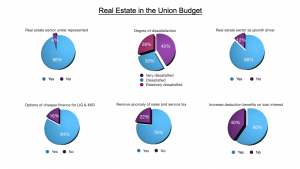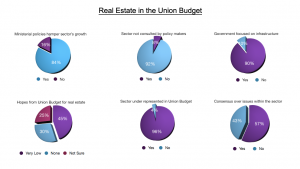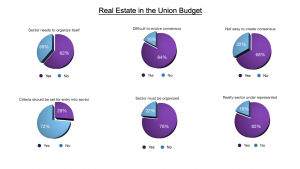 Nearly all the real estate developers, a whopping 96 per cent, across the country are cribbing for the sectors’ continued under representation in the Union Budget over the years. The remaining four per cent who are not that categorically critical of the Finance Ministers annual exercise, are only satisfied with the fact that the last year’s Union Budget indicated that the Government’s intention on the sector is on the right track now. The level and degree of dissatisfaction, however, varies from very dissatisfied (42 per cent) to being dissatisfied (30 per cent) and relatively dissatisfied (28 per cent).
Nearly all the real estate developers, a whopping 96 per cent, across the country are cribbing for the sectors’ continued under representation in the Union Budget over the years. The remaining four per cent who are not that categorically critical of the Finance Ministers annual exercise, are only satisfied with the fact that the last year’s Union Budget indicated that the Government’s intention on the sector is on the right track now. The level and degree of dissatisfaction, however, varies from very dissatisfied (42 per cent) to being dissatisfied (30 per cent) and relatively dissatisfied (28 per cent).
The realtors grievance is that the sector which provides the maximum to the GDP and is the second largest employment provider, is not given due importance in successive Union Budget. Nine out of 10 realtors, 88 per cent, assert that if steps are taken for the growth of the industry there is backward and forward linkage of more than 250 industries which includes steel, cement, electronic, infrastructure, hospitality, industrial development, banking, creation of disposable income and will also increase the employment in the country.
These are the findings of Track2Realty, the real estate market tracker among 100 realty companies. The Survey was conducted between January 12 and February 7. The real estate companies were carefully selected from across the country to gauge the pan-India mood. All size of realtors were approached, including both listed as well as non-listed companies. A set of 20 questions were asked to the developers and their top management regarding their opinion on the Union Budget and its impact on the sector, their wish list, issues & concerns, reasons of dissatisfaction, Finance Ministers response to the sector representatives, and their own consensus over the legitimate needs of the sector.
Without any exception all the developers’ prime wish list is that the sector be given industry status. Other wish list shared by 78 per cent realtors is to remove the anomaly of levying both the sales and service tax on the real estate industry. They crib on how upon a representation of the sector, the Delhi High court had termed the levy of service tax in addition to the sales tax as “Illegal”. As an argument they say it is sustainable that if the real estate is a “product” then it can attract sales tax and if it’s a “service” then a service tax is applicable. The realtors say if in this budget the finance minister can remove either of the two the same will help the developers leverage the benefit to the consumer in the same proportion.
Another wish list shared by the majority, more than 60 per cent is increase the deduction benefit on interest on housing loan  from existing 1,50,000 to 3,00,000, Increase the deduction u/s 80C for repayment of housing loan. Reduction in excise duty on Steel, RMC, and Cement to reduce the construction cost and to promote redevelopment of old and dilapidated buildings more than 50 years old, tax benefits/concessions should be given to the developers.
from existing 1,50,000 to 3,00,000, Increase the deduction u/s 80C for repayment of housing loan. Reduction in excise duty on Steel, RMC, and Cement to reduce the construction cost and to promote redevelopment of old and dilapidated buildings more than 50 years old, tax benefits/concessions should be given to the developers.
Interestingly, nearly eight out of 10, as many as 84 per cent, seem to be batting for the home buyers as well. They demand availability and accessibility to cheaper finance and incentive to home buyers particularly in LIG and MIG segment. “In the past 6 months, the home loan and project financing rates have gone up substantially and it is expected that it will further go up. In this scenario if government will not give the incentive to the home buyer, the demand may come down and sector will be badly affected,” they say.
However, 84 per cent of the developers blame squarely on the Finance Minister for the wide gap between theory and practice when it comes to granting the legitimate needs of the sector. Only a poor eight per cent say that the sector has been consulted by the Finance Minister over its legitimate issues and concerns through the industrial bodies. Others are not sure about it.
90 per cent feel the benefits of the Government’s focus on infrastructure development goes to the allied sectors like steel & cement and there is a deliberate raw deal to the sector. 30 per cent of the developers see no chance of their needs being addressed in the Union Budget this time too, while another 45 per cent see a very low chance and the rest 25 per cent are not sure about what will come out of the Pranab Mukherjee’s Budget Box for the sector this year.
However, the reasons shared by realtors for No Chance or Low chance is the fact that there has been high demand and low supply the sector attracts strong consumer behavior and therefore is a revenue generating stream for the budget. Hence, expecting fiscal subsidy or incentives are not forecasted and may not be forthcoming.
While all of them, 96 per cent, admit that the sector gets a raw deal with the Government, majority of them cite lack of proper representation in the industrial bodies as the reason of not being given a decent hearing by the Finance Minister. However, there is a clear difference of opinion over whether the sector is in a position to create consensus over its legitimate issue. 57 per cent of the realtors admit that the sector is now matured enough to create consensus over its wish list, remaining 43 per cent say the sector has thus far failed to make a consensus over its legitimate expectations with the budget.
 Six out of ten, 62 per cent, even admit the Government’s view that the sector needs to organize itself to be given adequate representation in the budget. More than 8 out of ten, 84 per cent, admit that the disorganized nature of the business makes it extremely difficult to evolve consensus and project a face of the industry. Nearly seven out of ten, 68 per cent, feel that the real estate being a state subject, it is not easy to create consensus and hence chances of remaining neglected remains high, unless given industry status.
Six out of ten, 62 per cent, even admit the Government’s view that the sector needs to organize itself to be given adequate representation in the budget. More than 8 out of ten, 84 per cent, admit that the disorganized nature of the business makes it extremely difficult to evolve consensus and project a face of the industry. Nearly seven out of ten, 68 per cent, feel that the real estate being a state subject, it is not easy to create consensus and hence chances of remaining neglected remains high, unless given industry status.
Only a minority 28 per cent say that Govt. needs to put in certain minimum entry criteria in order to prevent fly by night operators from the sector and bring in certain discipline in the sector. Though nearly 8 out of ten, 78 per cent, wants to see the sector organized and thus carry more weight in making demands in the budget or other policy related issues.
Four out of five, 82 per cent, believe that realty sector not only gets under represented but also it is treated with a bias. Instead of seeing it as one of the sector responsible for growth of the economy, it is looked with a bias and taxed accordingly. A feeling shared by majority of these realtors is that the sector is always treated as a cash rich segment and any representation for fiscal benefit or incentives is never acceded to.





